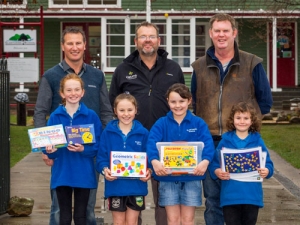$20k available for rural schools
HP New Zealand recently announced its second Rural Schools Competition, which gives rural New Zealand primary schools the chance to win a share of $20,000 worth of HP products and support.
 Chris Bascand (back-left), Hatuma's Nigel Wilson and farmer Hamish Thorne with students holding some of the new resources.
Chris Bascand (back-left), Hatuma's Nigel Wilson and farmer Hamish Thorne with students holding some of the new resources.
Canterbury’s rural primary schools have been given a welcome boost, thanks to the support of local farmers and fertiliser company, Hatuma Dicalcic Phosphate Ltd.
The initiative, calls on farmers to nominate a school that they feel could benefit from Hatuma’s ‘Growing Minds’ fund. Over the last six years, Hatuma has donated over $30,000 to New Zealand’s rural schools through the programme.
One such beneficiary of the fund is Glentunnel School in mid-Canterbury, which attracted huge support from farmers.
Glentunnel School Principal, Chris Bascand says the 112 children school relies on the support of the community.
“The support comes in the way of a cash donation which really helps us. As a small school, we still have a lot of the same overheads as a bigger school but we generally have less money to operate. So the fact our local farmers are getting in behind us is the type of boost we need.”
When Bascand first arrived at Glentunnel School, the roll stood at 32, however over the last 10 years this has increased to 112. Bascand says the extra money has enabled the school to purchase more sports gear and maths equipment.
Local farmer Hamish Thorne sends his daughter Alice to Glentunnel School and says he tries his best to support the school in any way he can, the fund was one way he could get behind the school.
“It’s vital that we support our local school. They are the centre of any rural community. Before Chris Bascand arrived, our school was in a sad state but he has done wonders for it and really got the community on board, which has been vital.”
Bascand says rural schools are challenged in many ways by isolation, more extremes in weather and often changing communities and every little bit helps.
“The school relies on community volunteering and donations which are the schools life support and the funds open up more opportunity.
“We take our hats off to Hatuma for their Growing Minds Fund because it is contributing hugely to rural communities.”
Hatuma field representative, Nigel Wilson, who has three daughters at Glentunnel School, says feedback about the initiative has been very positive.
“The Hatuma Growing Minds fund has been set up in a way that farmers can carry on business as usual and their local school benefits. So it’s a win for everyone.”
Wilson says the fund also gives farmers who do not have children at the school an opportunity to support their rural school.
“With traditional funding for rural schools lessening, we feel we have a role to play as a rural business, focused on our community. We want to show our support for the next generation of rural New Zealanders. It costs our customers nothing extra and it's Hatuma's way of giving back to the community.”
A multi-cultural team is helping to establish one of New Zealand's largest plantings of premium eating grapes - while learning each other's languages and cultures along the way.
The World Wide Sires National All Day Breeds Best Youth Camp Best All Rounder plaudit has become family affair, with 2026 Paramount Cup winner Holly Williams following in her sister Zara's footsteps.
DairyNZ is giving New Zealand farmers a unique opportunity to gain hands-on governance and leadership experience within the dairy sector.
Herd improvement company LIC has posted a 5.2% lift in half-year revenue, thanks to increasing demand for genetics.
According to the latest Fresh Produce Trend Report from United Fresh, 2026 will be a year where fruit and vegetables are shaped by cost pressures, rapid digital adoption, and a renewed focus on wellbeing at home.
The Roar is a highlight of the game hunting calendar in New Zealand, with thousands of hunters set to head for the hills to hunt male stags during March and April.